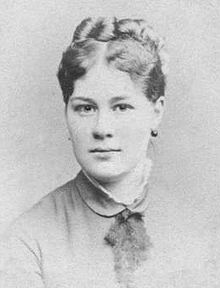Cecilia Beaux
| Cecilia Beaux | |
|---|---|

Cecilia Beaux ca. 1888
|
|
| Born |
May 1, 1855 Philadelphia, Pennsylvania |
| Died | September 7, 1942 (aged 87) Gloucester, Massachusetts |
| Nationality | American |
| Education | Francis Adolf Van der Wielen, Académie Julian, Académie Colarossi |
| Known for | Portrait painting |
| Movement | Impressionism |
| Awards | Mary Smith Prize, Pennsylvania Academy of the Fine Arts (1885, 1887, 1891, 1892) |
Cecilia Beaux (May 1, 1855 – September 7, 1942) was an American society portraitist, in the manner of John Singer Sargent. She was a near-contemporary of American artist Mary Cassatt and also received her training in Philadelphia and France. Her sympathetic renderings of the American ruling class made her one of the most successful portrait painters of her era.
Eliza Cecilia Beaux was born on May 1, 1855 in Philadelphia, Pennsylvania. She was the youngest daughter of French silk manufacturer Jean Adolphe Beaux and teacher Cecilia Kent Leavitt. Her mother was the daughter of prominent businessman John Wheeler Leavitt of New York City and his wife Cecilia Kent of Suffield, Connecticut. Cecilia Kent Leavitt died from puerperal fever 12 days after giving birth at age 33. Cecilia "Leilie" Beaux and her sister Etta were subsequently raised by their maternal grandmother and aunts, primarily in Philadelphia. Her father, unable to bear the grief of his loss, and feeling adrift in a foreign country, returned to his native France for 16 years, with only one visit back to Philadelphia. He returned when Cecilia was two, but left four years later after his business failed. As she confessed later, "We didn’t love Papa very much, he was so foreign. We thought him peculiar." Her father did have a natural aptitude for drawing and the sisters were charmed by his whimsical sketches of animals. Later, Beaux would discover that her French heritage would serve her well during her pilgrimage and training in France.
In Philadelphia, Beaux's aunt Emily married mining engineer William Foster Biddle, whom Beaux would later describe as "after my grandmother, the strongest and most beneficent influence in my life." For fifty years, he cared for his nieces-in-law with consistent attention and occasional financial support. Her grandmother, on the other hand, provided day-to-day supervision and kindly discipline. Whether with housework, handiwork, or academics, Grandma Leavitt offered a pragmatic framework, stressing that "everything undertaken must be completed, conquered." The Civil War years were particularly challenging, but the extended family survived despite little emotional or financial support from Beaux's father.
...
Wikipedia
